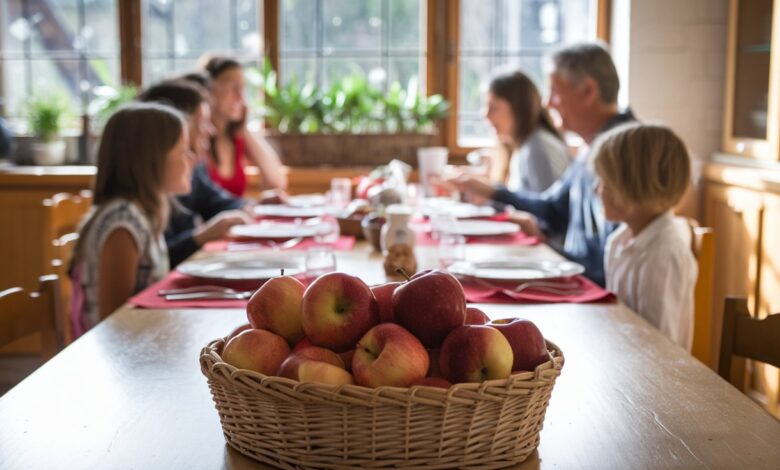The Heart of the Home: Why Family Meals Matter

Gather around the table, where stories unfold and laughter fills the air. Family meals are more than just a time to eat; they’re an opportunity to connect, share experiences, and create lasting memories. In our fast-paced world, where schedules clash and everyone seems to be on the go, making time for these shared moments becomes even more crucial. Whether it’s a bustling dinner after a long day or weekend brunches filled with chatter, family meals weave threads of love into the fabric of our lives. Let’s explore why these gatherings hold such significance in our homes and how they can enrich both our relationships and well-being.
Importance of family meals

Family meals are more than just a time to eat; they create bonds that last a lifetime. Sitting around the table allows family members to connect, share stories, and enjoy each other’s company in a relaxed setting.
These moments foster communication. They allow everyone to voice their thoughts and feelings, building trust within the family unit.
Moreover, regular meals together can strengthen relationships among siblings and parents alike. It creates a sense of belonging and togetherness that is hard to replicate in our bustling lives.
In today’s fast-paced world, prioritizing these shared experiences is vital for emotional well-being. The kitchen becomes a hub of love where laughter mingles with the aroma of home-cooked dishes.
The importance of family meals transcends nutrition; it’s about nurturing connections while creating cherished memories together at the dinner table.
Benefits of Eating Together
Eating together as a family fosters open communication. It’s a time when everyone can share their day, discuss experiences, and express feelings. This connection strengthens relationships among family members.
Health-wise, shared meals often lead to better nutrition. Families tend to prepare balanced dishes that include fruits, vegetables, and whole grains. Eating together encourages mindful eating habits too.
For children, family meals play a vital role in development. Regularly dining with loved ones helps improve social skills and instills values like manners and sharing. Children are also more likely to try new foods when they see others enjoying them.
The simple act of gathering around the table creates lasting memories filled with laughter and stories—moments that become cherished traditions over time. Sharing food cultivates a sense of belonging that every family needs.
Improved communication and relationships
Gathering around the table for family meals creates a space for open dialogue. It’s a moment when everyone can share their day, express feelings, and discuss challenges.
These interactions foster strong bonds. As conversations flow, laughter often fills the air. Sharing stories or even silly moments strengthens connections in ways that busy routines cannot replicate.
Kids learn valuable communication skills during these times as well. They practice articulating thoughts and listening to others—a crucial part of social development.
Family meals also allow parents to model effective communication strategies. This sets an example for children on how to engage with others respectfully and thoughtfully.
When family members regularly sit down together, relationships flourish. Trust builds over time, making it easier to tackle tough topics or conflicts in the future without fear or hesitation.
Better nutrition and health outcomes
Family meals play a pivotal role in promoting better nutrition and health. When families gather to eat, they are more likely to consume balanced diets rich in fruits, vegetables, whole grains, and lean proteins.
Cooking at home allows for greater control over ingredients. Families can choose healthier options while avoiding excessive sugar, salt, and unhealthy fats often found in fast food.
Eating together also encourages mindful eating habits. It’s easier to savor each bite when surrounded by loved ones rather than rushing through a meal alone.
Additionally, children exposed to family meals tend to adopt healthier eating patterns early on. They learn about portion sizes and the importance of variety from observing their parents’ choices.
This shared experience nurtures not just physical well-being but also emotional connections that contribute positively to overall health outcomes. Eating as a family fosters an environment where everyone feels valued and cared for during mealtime.
Positive impact on children’s development
Family meals are more than just a time to eat; they play a crucial role in children’s development. Sharing food fosters a sense of belonging and security. When kids gather around the table, they feel valued and connected.
During these moments, children learn essential social skills. They observe how to communicate effectively, listen attentively, and express themselves. This interaction nurtures their emotional intelligence.
Moreover, regular family meals can enhance academic performance. Studies show that kids who dine with their families tend to have better grades and higher self-esteem. The routine creates an environment where learning is encouraged.
Eating together also introduces children to diverse foods and cooking practices. It opens their minds to new flavors while promoting healthy eating habits from a young age. These experiences shape not only their preferences but also lifelong attitudes towards food.
Overcoming Challenges to Family Meals
Busy lives often make it tough to gather around the table. Between work, school, and extracurricular activities, family meals can become a low priority.
One solution is to schedule meal times as you would any important appointment. Block off that time in your calendar and treat it like an unmissable event.
Picky eaters or dietary restrictions can also complicate things. Instead of letting food preferences divide the family, encourage everyone to contribute ideas for meals. This fosters inclusivity and excitement about what’s on the menu.
Another great strategy is batch cooking or meal prepping on weekends. You’ll have delicious options ready throughout the week without feeling overwhelmed.
Flexibility is key too; if dinner isn’t feasible one night, consider breakfast or lunch together instead. Creative thinking helps keep family meals alive even when life gets hectic.
Busy schedules and conflicting priorities
Life today is a whirlwind of activities. Between work commitments, school events, and social obligations, finding time for family meals can feel impossible.
Busy schedules often lead to quick fixes—takeout or pre-packaged foods become the norm. But these shortcuts can detract from meaningful connections around the dinner table.
Conflicting priorities arise when everyone has different agendas. Parents juggle their jobs while kids have extracurricular activities competing for attention. Rushing through mealtimes becomes common, leaving little room for conversation or bonding.
It’s essential to recognize that family meals don’t always have to occur at dinnertime. Breakfast together or weekend brunches can help foster those vital connections amid chaos.
Being intentional about carving out time is a step toward keeping family traditions alive despite life’s busyness. Balancing schedules may require effort, but it creates lasting memories and strengthens relationships within the home.
Picky eaters or dietary restrictions
Picky eaters and dietary restrictions can pose challenges to family meals. It’s common for children to have preferences that differ from adults. Navigating these tastes takes patience, creativity, and understanding.
Involving everyone in meal planning can ease the tension. Ask each family member what they’d like to eat. This inclusion fosters a sense of ownership over mealtime choices.
When it comes to dietary restrictions, flexibility is key. Explore substitutions for ingredients that accommodate different needs while still keeping meals enjoyable for all.
Experiment with new recipes together as a family activity. Encourage open conversations about food preferences without judgment.
Remember, it’s not just about the food on the table; it’s about connection and shared experiences too!
Tips for Successful Family Meals
Planning ahead can transform the experience of family meals. Take a moment each week to decide what everyone will enjoy. This sets expectations and makes shopping easier.
Involve every family member in meal prep. Allowing kids to help with cooking fosters a sense of responsibility and ownership over their food choices. They might even surprise you with creative ideas!
Keep things light-hearted during mealtime. Use conversation starters or fun themes like “Taco Tuesday” or “Pizza Night.” This encourages laughter and engagement among everyone at the table.
Try to establish regular meal times, making it part of your family’s routine. Consistency helps create an atmosphere where everyone knows they belong.
Embrace flexibility if something doesn’t go as planned. The goal is connection, so savor these moments together regardless of the menu!
Plan ahead and involve everyone in meal prep
Planning ahead is key to making family meals a regular part of your routine. Set aside time each week to brainstorm meal ideas together. This not only gets everyone excited but also allows for different preferences to be considered.
Involving everyone in the meal prep can turn cooking into a fun family activity. Assign tasks based on age and skill level—little ones can wash vegetables, while older kids might chop or stir. Everyone feels included this way.
Use these moments as opportunities for connection. Share stories about your day while chopping onions or mixing ingredients. It becomes less about just preparing food and more about bonding as a family.
Consider incorporating themed nights, like Taco Tuesday or Pasta Friday, where everyone contributes an ingredient or helps with the preparation process. Making it interactive creates lasting memories around the dinner table that go beyond just eating together.
Make it fun and
Family meals should be a time to unwind and enjoy each other’s company. Getting everyone involved in the cooking process can transform mealtime into an engaging experience. Consider letting children help set the table or choose a recipe for dinner.
You can turn meal prep into a fun activity by playing music or creating themed nights, such as taco Tuesdays or pasta Fridays. Share stories about your day, discuss favorite things, or even play trivia games while you eat.
Incorporating laughter and joy during family meals fosters connections that go beyond just sharing food. It brings people together and creates lasting memories that will strengthen family bonds over time. Family meals are more than just nourishment; they’re vital moments of connection that we should cherish and prioritize amidst our busy lives.



